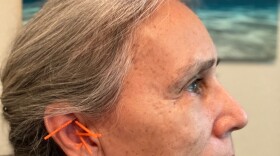-
Paño Connections is making its way around Laramie. The exhibit shows artwork from incarcerated individuals across Wyoming’s five correctional facilities.
-
The Marshall Project, a newsroom that investigates the criminal justice system, dug into these numbers to get a better understanding of how low staffing impacts safety and mental health for workers and inmates alike.
-
The goal is to build permanent, supportive housing for the vulnerable population.
-
Recidivism rates in the U.S. are some of the highest in the world. And in Wyoming, 33 percent of inmates are back in prison within the first year. But studies show that animal therapy can help reduce that by teaching things like responsibility, nonviolence and empathy. Wyoming has a special program – one of only five in the country – that teaches inmates how to tame wild horses.
-
A new report reveals the full picture of correctional control across the United States, including incarceration, probation and parole. Rates of incarceration and supervision vary widely across the Mountain West.
-
Adree Edmo officially became the first incarcerated person to get court-ordered gender confirmation surgery in July 2020. She has since been released, but her Idaho case set a precedent for how cases of gender dysmorphia will be handled within prisons. Now, her team of lawyers will be granted nearly $2.6 million in attorneys fees for the years of litigation.
-
Indigenous people are over represented in jails and prisons and this virtual conference aims to brain storm how to fix that.
-
The Bureau of Indian Affairs announced reforms to its criminal justice system Monday, including more training on how to perform death investigations. That follows a Mountain West News Bureau and NPR investigation into more than a dozen deaths in tribal jails. There are also ongoing questions about the firm hired to review the deaths for BIA. Some Congressmen have been critical of the BIA’s choice because the firm was led by a former agency official.
-
The lawyers for Adree Edmo, the first incarcerated person to receive federally court-ordered gender confirmation surgery, are asking Idaho to pay back $2.82 million in attorneys fees.
-
Racial disparities are deeply pronounced in state prisons across the nation – and some Western states top the list.
© 2026 Wyoming Public Media
800-729-5897 | 307-766-4240
Wyoming Public Media is a service of the University of Wyoming
800-729-5897 | 307-766-4240
Wyoming Public Media is a service of the University of Wyoming

Play Live Radio
Next Up:
0:00
0:00
Available On Air Stations











